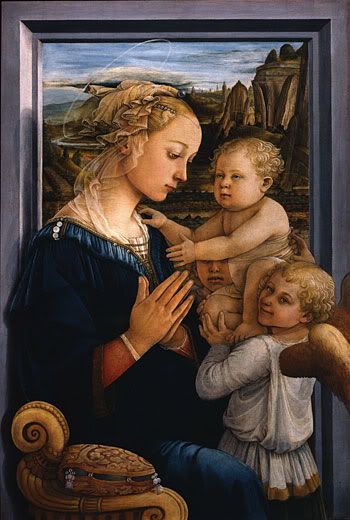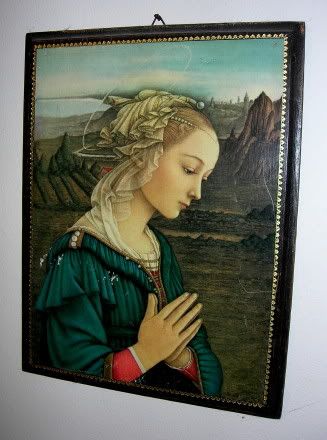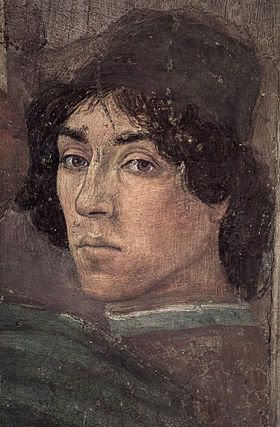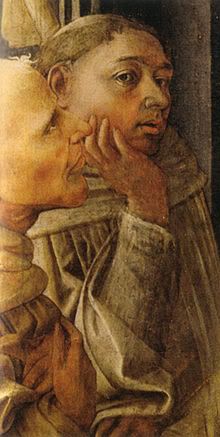Tue 17 Jan 2012
Journey around my room: Fra Lippo Lippi
Posted by PJ under art, journey around my room, love, romance, stories, travel
[4] Comments
Not to be confused with these guys.
No, I’m talking about the guy who painted this:

I became enamored of this painting when studying Art History the year before I went to Europe for the first time—so enamored, in fact, with all the luscious Italian Renaissance art that I had to go see it in person. I was poor as dirt, but I bent all my will towards saving money to go. I quit Santa Monica College and worked full time for a year before applying to UCLA. My mother was freaked that I wouldn’t finish school, but I knew I would once I got a little traveling out of my system. Ostensibly, I was saving towards the Big U (and I did a little of that), but really I was hellbent on going to Europe. And I went. And then I came back and settled in to working part time to put myself through college. I did earn my BA, much to my mother’s relief.
But, oh! The sights I saw before that. I saw the original of my beloved Lippi and many another wonderful painting at the Uffizi in Florence. And the David at the Academia! Ghiberti’s doors! So much, so much. I was swimming in honey beneath the Tuscan sun.
A few days later I was in Assisi going through the basilica to see the Giotto and Lorenzetti frescoes, back before the basilica and the frescoes got ruined in an earthquake. I was going through the Upper Church and there was an open door leading to a outdoor balcony. It was a glorious, sunny fall day and this balcony offered staggering views of the rolling Umbrian countryside so I was naturally drawn outside. The monks probably counted on luring the tourists like that on beautiful days because they’d set up a little gift shop out there. I found this and had to have it:

As you can see, it’s somewhat the worse for wear. It’s been with me through many travels, many household packing ups and unpackings. More scars seem to appear after each unpacking though I’d swear they weren’t there when I wrapped my little treasure in newspaper and stowed it carefully in a box. It’s been on the wall of every place I’ve lived since I bought it, and I still love it, despite (or maybe because of) its battered state. I still go gooey in the center when I really look at it (as opposed to casually glancing as I pass it on a daily basis).
Why am I so in love with the painting? First, because it’s so beautiful, and I’m a sucker for beautiful forms. As that old goober, Robert Browning, says in his poem Fra Lippo Lippi, “If you get simple beauty and naught else,/You get about the best thing God invents.” And who can resist the saucy look on the face of that one angel turned towards “the camera”? I can’t help thinking that’s a stand-in for saucy ol’ Lippi himself, sharing the joke with the viewer. What joke? Well, that involves a story…
Being a romantic I suspect I’m as much in love with the story behind the painting as I am of the painting itself. My Art History teacher, Mario Semere, was a gorgeous storyteller—and I mean gorgeous in form as well as gorgeous in word. I was not immune to either. Mario’s gift brought these paintings, the men who painted them, and the Italian Renaissance to pulsing life in those classrooms. His survey courses were a joy, first to last, always crowded and hard to get into. He told us how Filippo Lippi, sent to the monastery at eight years of age, grew into a fine painter—so fine the church turned a blind eye to his love for the ladies. Until, that is, he fell in love with a beautiful young nun named Lucrezia Buti. That’s her painted as the Madonna.
They ran off together. He got her with child. More than once. This is their son, Filippino, who became a prominent painter in his own right:

The church did not release him from his vows, so although he never returned to the monastery, he had no money. He lived on the generosity of patrons like Cosimo de Medici—but, alas, he spent his money as soon as he got it. On the ladies, mostly. A bit of a scoundrel all his life, but a mentor to the likes of Sandro Botticelli, and a great painter of beautiful things.
Here’s the Wikipedia version of his life, and here’s the full text of Browning’s poem. I warn you: this is one of Browning’s long dramatic monologue poems. I’m not much of a fan of those, though I like some of his shorter work.

I too was a student of Mario Semere at SMCC. I believe it was his first year teaching there. I learned that he was from Chiasso, on the Swiss – Italian border, near Lake Como. I attended some of his lecture courses, as well as a very excellent design class. I recall one of his favorite expressions was… “come on people, squeeze the old brain” when our responses weren’t as creative as he expected them to be. He was a fine teacher and handsome too.
Oh yes! He was quite the honey. But he was a very gifted teacher. I still remember his zest for his subject matter and some of the things he taught. Lovely memories.
This brings back memories! Do you know if Mario is still alive? I am curious sometimes about him….I’m sure I had a similar experience to you and many others…he really brought art history to life.
Hi, Valerie: His profile is still up at Santa Monica College, so it looks like he still teaches there. He’s one of those teachers I’ve never forgotten.